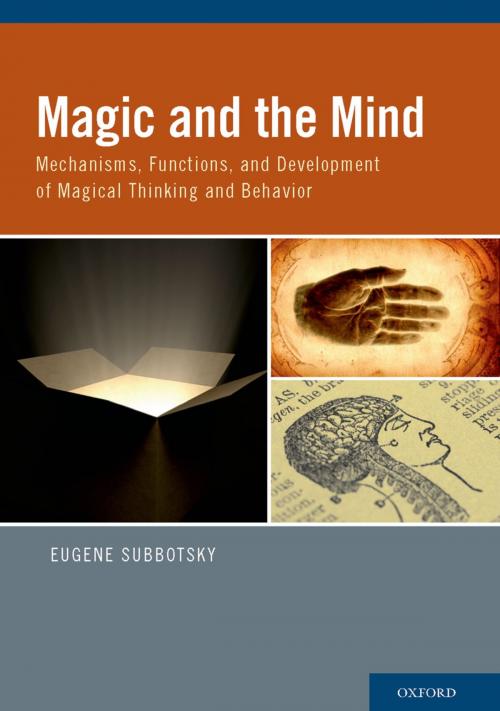Magic and the Mind
Mechanisms, Functions, and Development of Magical Thinking and Behavior
Nonfiction, Health & Well Being, Psychology, Developmental Psychology, Child & Adolescent, Child Development| Author: | Eugene Subbotsky | ISBN: | 9780190453114 |
| Publisher: | Oxford University Press | Publication: | March 31, 2010 |
| Imprint: | Oxford University Press | Language: | English |
| Author: | Eugene Subbotsky |
| ISBN: | 9780190453114 |
| Publisher: | Oxford University Press |
| Publication: | March 31, 2010 |
| Imprint: | Oxford University Press |
| Language: | English |
Magical thinking and behavior have traditionally been viewed as immature, misleading alternatives to scientific thought that in children inevitably diminish with age. In adults, these inclinations have been labeled by psychologists largely as superstitions that feed on frustration, uncertainty, and the unpredictable nature of certain human activities. In Magic and the Mind, Eugene Subbotsky provides an overview of the mechanisms and development of magical thinking and beliefs throughout the life span while arguing that the role of this type of thought in human development should be reconsidered. Rather than an impediment to scientific reasoning or a byproduct of cognitive development, in children magical thinking is an important and necessary complement to these processes, enhancing creativity at problem-solving and reinforcing coping strategies, among other benefits. In adults, magical thinking and beliefs perform important functions both for individuals (coping with unsolvable problems and stressful situations) and for society (enabling mass influence and promoting social harmony). Operating in realms not bound by physical causality, such as emotion, relationships, and suggestion, magical thinking is an ongoing, developing psychological mechanism that, Subbotsky argues, is integral in the contexts of politics, commercial advertising, and psychotherapy, and undergirds our construction and understanding of meaning in both mental and physical worlds. Magic and the Mind represents a unique contribution to our understanding of the importance of magical thinking, offering experimental evidence and conclusions never before collected in one source. It will be of interest to students and scholars of developmental psychology, as well as sociologists, anthropologists, and educators.
Magical thinking and behavior have traditionally been viewed as immature, misleading alternatives to scientific thought that in children inevitably diminish with age. In adults, these inclinations have been labeled by psychologists largely as superstitions that feed on frustration, uncertainty, and the unpredictable nature of certain human activities. In Magic and the Mind, Eugene Subbotsky provides an overview of the mechanisms and development of magical thinking and beliefs throughout the life span while arguing that the role of this type of thought in human development should be reconsidered. Rather than an impediment to scientific reasoning or a byproduct of cognitive development, in children magical thinking is an important and necessary complement to these processes, enhancing creativity at problem-solving and reinforcing coping strategies, among other benefits. In adults, magical thinking and beliefs perform important functions both for individuals (coping with unsolvable problems and stressful situations) and for society (enabling mass influence and promoting social harmony). Operating in realms not bound by physical causality, such as emotion, relationships, and suggestion, magical thinking is an ongoing, developing psychological mechanism that, Subbotsky argues, is integral in the contexts of politics, commercial advertising, and psychotherapy, and undergirds our construction and understanding of meaning in both mental and physical worlds. Magic and the Mind represents a unique contribution to our understanding of the importance of magical thinking, offering experimental evidence and conclusions never before collected in one source. It will be of interest to students and scholars of developmental psychology, as well as sociologists, anthropologists, and educators.















